Related Research Articles

Galaxy Science Fiction was an American digest-size science fiction magazine, published in Boston from 1950 to 1980. It was founded by a French-Italian company, World Editions, which was looking to break into the American market. World Editions hired as editor H. L. Gold, who rapidly made Galaxy the leading science fiction magazine of its time, focusing on stories about social issues rather than technology.

The Magazine of Fantasy & Science Fiction is a U.S. fantasy and science fiction magazine first published in 1949 by Mystery House, a subsidiary of Lawrence Spivak's Mercury Press. Editors Anthony Boucher and J. Francis McComas had approached Spivak in the mid-1940s about creating a fantasy companion to Spivak's existing mystery title, Ellery Queen's Mystery Magazine. The first issue was titled The Magazine of Fantasy, but the decision was quickly made to include science fiction as well as fantasy, and the title was changed correspondingly with the second issue. F&SF was quite different in presentation from the existing science fiction magazines of the day, most of which were in pulp format: it had no interior illustrations, no letter column, and text in a single column format, which in the opinion of science fiction historian Mike Ashley "set F&SF apart, giving it the air and authority of a superior magazine".

Steven H Silver is an American science fiction fan and bibliographer, publisher, author, and editor. He has been nominated for the Hugo Award for Best Fan Writer twelve times and Best Fanzine six times without winning.

Edwin Charles Tubb was a British writer of science fiction, fantasy and western novels. The author of over 140 novels and 230 short stories and novellas, Tubb is best known for The Dumarest Saga, an epic science-fiction saga set in the far future. Michael Moorcock wrote, "His reputation for fast-moving and colourful SF writing is unmatched by anyone in Britain."

Black Gate is a fantasy magazine published by New Epoch Press. It was published in glossy print until 2011, after which it shifted online.

Martha Wells is an American writer of speculative fiction. She has published a number of fantasy novels, young adult novels, media tie-ins, short stories, and nonfiction essays on fantasy and science fiction subjects. Her novels have been translated into twelve languages. Wells has won four Hugo Awards, two Nebula Awards and three Locus Awards for her science fiction series The Murderbot Diaries. She is also known for her fantasy series Ile-Rien and The Books of the Raksura. Wells is praised for the complex, realistically detailed societies she creates; this is often credited to her academic background in anthropology.
Craig Kee Strete is an American science fiction writer of Cherokee descent. He is noted for his use of American Indian themes and has had multiple Nebula Award nominations.

Nebula Science Fiction was the first Scottish science fiction magazine. It was published from 1952 to 1959, and was edited by Peter Hamilton, a young Scot who was able to take advantage of spare capacity at his parents' printing company, Crownpoint, to launch the magazine. Because Hamilton could only print Nebula when Crownpoint had no other work, the schedule was initially erratic. In 1955 he moved the printing to a Dublin-based firm, and the schedule became a little more regular, with a steady monthly run beginning in 1958 that lasted into the following year. Nebula's circulation was international, with only a quarter of the sales in the United Kingdom; this led to disaster when South Africa and Australia imposed import controls on foreign periodicals at the end of the 1950s. Excise duties imposed in the UK added to Hamilton's financial burdens, and he was rapidly forced to close the magazine. The last issue was dated June 1959.

The 1975 Annual World's Best SF is an anthology of science fiction short stories edited by Donald A. Wollheim and Arthur W. Saha, the fourth volume in a series of nineteen. It was first published in paperback by DAW Books in May 1975, followed by a hardcover edition issued in September of the same year by the same publisher as a selection of the Science Fiction Book Club. For the hardcover edition the original cover art of Jack Gaughan was replaced by a new cover painting by Richard V. Corben. The paperback edition was reissued by DAW in December 1980 under the variant title Wollheim's World's Best SF: Series Four, this time with cover art by Vicente Segrelles. A British hardcover edition was published by The Elmfield Press in November 1976 under the variant title The World's Best SF Short Stories No. 2.
Arsen Julius Darnay is a Hungarian-American science fiction writer.
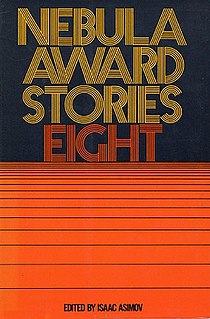
Nebula Award Stories Eight is an anthology of science fiction short works edited by American writer Isaac Asimov. It was first published in hardcover in November 1973, in the United States by Harper & Row and in the United Kingdom by Gollancz. The British edition bore the variant title Nebula Award Stories 8. Paperback editions followed from Berkley Medallion in the U.S. in September 1975, and Panther in the U.K. in the same year; both paperback editions adopted the British version of the title. The book has also been published in German.

Nebula Award Stories 11 is an anthology of science fiction short works edited by Ursula K. Le Guin. It was first published in the United Kingdom in hardcover by Gollancz in November 1976. The first American edition was published in hardcover by Harper & Row in February 1977. Paperback editions followed from Corgi in the U.K. in July 1978, and Bantam Books in the U.S. in August 1978. The American editions bore the variant title Nebula Award Stories Eleven.
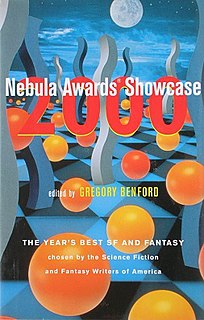
Nebula Awards Showcase 2000 is an anthology of science fiction short works edited by Gregory Benford. It was first published in hardcover and trade paperback by Harcourt in April 2000.
"The Fire When It Comes" is a fantasy short story by American writer Parke Godwin. It was first published in the January 1981 issue of The Magazine of Fantasy & Science Fiction.
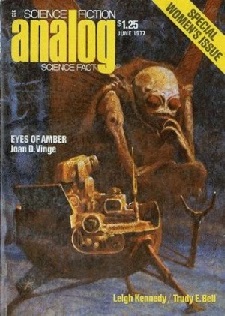
"Eyes of Amber" is a science fiction short story by American writer Joan D. Vinge. It was first published as the cover story for the June 1977 issue of Analog Science Fiction and Fact.
The Death of the Necromancer is a 1998 fantasy novel by Martha Wells. It was first published by Eos/Harper Collins.
"Her Furry Face" is a 1983 science fiction short story by American writer Leigh Kennedy. It was first published in Asimov's Science Fiction.
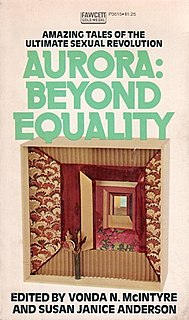
Aurora: Beyond Equality is an anthology of feminist science fiction edited by Vonda N. McIntyre and Susan Janice Anderson and published in 1976.
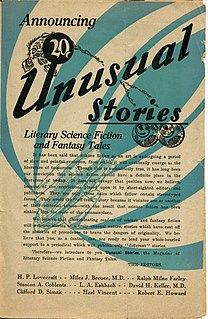
Marvel Tales and Unusual Stories were two related American semi-professional science fiction magazines published in 1934 and 1935 by William L. Crawford. Crawford was a science fiction fan who believed that the pulp magazines of the time were too limited in what they would publish. In 1933, he distributed a flyer announcing Unusual Stories, and declaring that no taboos would prevent him from publishing worthwhile fiction. The flyer included a page from P. Schuyler Miller's "The Titan", which Miller had been unable to sell to the professional magazines because of its sexual content. A partial issue of Unusual Stories was distributed in early 1934, but Crawford then launched a new title, Marvel Tales, in May 1934. A total of five issues of Marvel Tales and three of Unusual Stories appeared over the next two years.
"The Political Officer" is a science fiction novella by Charles Coleman Finlay. It was first published in The Magazine of Fantasy & Science Fiction, in April 2002.
References
- ↑ Strete, Craig, in The Encyclopedia of Science Fiction ; entry by John Clute; published October 26, 2021; retrieved April 14, 2022
- ↑ Time Deer, at Science Fiction Writers of America; retrieved April 14, 2022
- ↑ SCIENCE FICTION, by Gerard Jonas, in The New York Times ; published January 25, 1981; retrieved April 14, 2022
- ↑ NEBULA AWARD STORIES ELEVEN, reviewed at Kirkus Reviews ; published February 1, 1976; archived online September 27, 2011; retrieved April 14, 2022
- ↑ The History of the Science-fiction Magazine, p.65; by Mike Ashley; published 2000 by Liverpool University Press
- ↑ Birthday Reviews: Craig Strete’s “Time Deer”, by Steven H Silver, in Black Gate ; published May 6, 2018; retrieved April 14, 2022
- ↑ "I Have Seen the Future and I Won't Go": The Comic Vision of Craig Strete's Science Fiction Stories, by Kristina Baudemann; published in Studies in American Indian Literatures (University of Nebraska Press), vol. 29, no. 4 (Winter 2017); p. 76-101